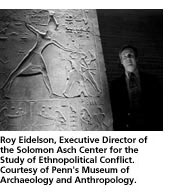
 In 1995 Boutros Boutros-Ghali climbed out of his white United Nations helicopter near a Catholic mission in Nyarubuye, Rwanda. Bodyguards with assault rifles, one carrying the secretary general's flak jacket, fanned out and followed him through a stand of banana trees and past barefoot villagers. One held up a placard that asked, "Where was the UN before the genocide?" Boutros-Ghali walked by without speaking, his head bent.
In 1995 Boutros Boutros-Ghali climbed out of his white United Nations helicopter near a Catholic mission in Nyarubuye, Rwanda. Bodyguards with assault rifles, one carrying the secretary general's flak jacket, fanned out and followed him through a stand of banana trees and past barefoot villagers. One held up a placard that asked, "Where was the UN before the genocide?" Boutros-Ghali walked by without speaking, his head bent.
A year before, the Hutu militia had come to the mission compound in this African village. They sorted out the Tutsis and then slaughtered thousands, hacking them to death with machetes. The massacre was part of a much larger killing that took the lives of 800,000 Rwandans, mostly Tutsis, over a six-week period. Some have calculated that the pace of murder was five times the rate of extermination in the Nazi death camps.
At the mission, the dead were left where they fell as an impromptu memorial. The smell of death no longer lingered. The UN leader was led to a room filled with silence and sunlight that slanted down rows of skeletons clothed in rags. Femurs, shoulder joints, ankles, ribs, and teeth lay scattered across the floor. The grass outside was strewn with human skulls, some with gaping jaws. A torso attached to a neck and lower jaw stood beside a dirty sneaker that shod the bones of a foot. Boutros-Ghali placed a wreath, then spoke a few words to a group of survivors huddled on the church steps. "The international community," he said, had not forgotten them. "Courage!" he urged in French just before departing. No one understood.
Rwanda, Sri Lanka, Israel/Palestine, Sierra Leone, Liberia, Bosnia, Kosovo, Northern Ireland, and the Kashmir are just a few of the places that have been wracked by often brutal ethnic strife in recent years. The phenomenon has added to our lexicon the sinister term "ethnic cleansing"--a dark reminder of the "showers" at Auschwitz and that earlier and greater "cleansing." As the Holocaust generation disappears, events like those in Rwanda remind us how frail is the hope they clung to: "Never again!"
It is all too easy to throw up our hands in consternation when trying to understand the great festivals of murder and hate that scar our world with mass graves, burnt villages, and refugee camps. "Everywhere we work," the former UN chief brooded, "we are struggling against the culture of death." What forces are at work in these upheavals? Why have they happened? Why do they continue to happen?
Can the World Cope? The Challenge of Ethnopolitical Conflict is the theme of the upcoming Merriam Symposium. Hosted by the School of Arts and Sciences, the conference will look at some of the recent ethnic conflicts in Europe, Africa, and Asia. Reporters who've witnessed these events and scholars who study them will discuss some of the important issues for understanding these most troubling and bitter struggles. Stressing psychological perspectives, themes will include the enigma of group identification, the social construction of moral violations, forgiveness, conflict resolution, bystander behavior, and the psychology of ethnic killers.
"There is perhaps no more dangerous force in social relations than the human mind," wrote psychologists Dacher Keltner and Robert Robinson. New York Times reporter Chris Hedges, who will be a panelist at the symposium, makes a similar comment: "By failing to explain the origins of these conflicts," he writes, "we have turned the participants into aliens." In his impassioned essay he drives the point even closer to home: "The truth is, there is nothing intrinsically Balkan or German or African about evil. It lurks within all human hearts."